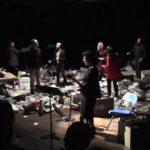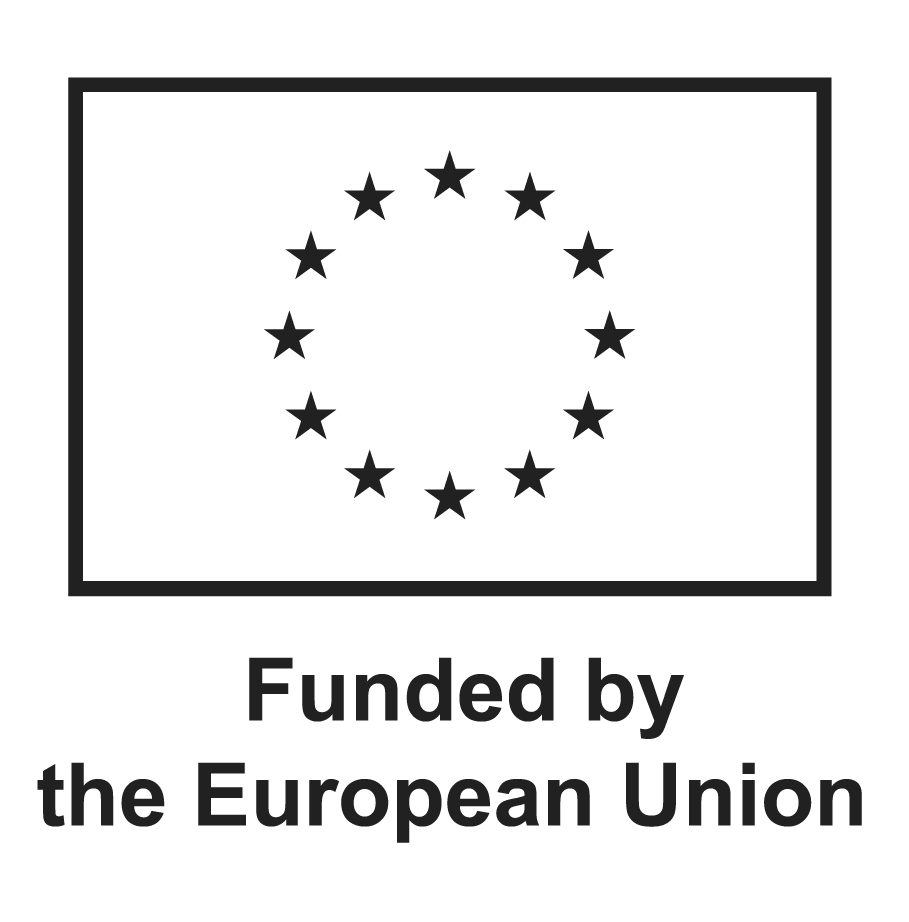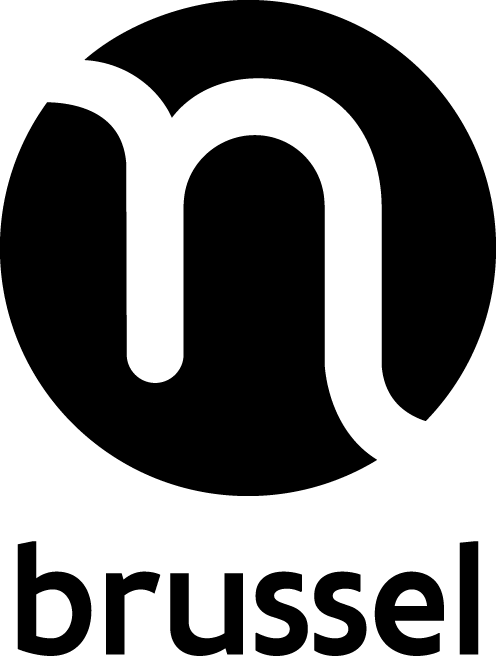

NOTE: Registration for the workshops is required! The fee is 20 euro per workshop. Send an e-mail with the workshop(s) of your choice to eveline@q-o2.be to book your place. Bookings take place on a first come first served basis. The reply you will receive contains all the details for bank transfer to confirm your participation.
Monday 19 – Friday 23 February
Tim Parkinson – Time with people
(venue Ictus, Brussels – with five-day commitment)
Using absurdity, humour, and non-narrativity to redefine notions of music and memory, Time With People (2013) is an hour-long music and theatre work by British composer Tim Parkinson (1973). As Parkinson writes, the opera in seven scenes for ten people and assorted objects “redefines fundamentals of opera from its 16th century origins… reconceived from elements of 21st century post-historical culture.” Time With People is not an opera in the traditional sense. There are no characters, costumes, or even orchestral instruments. The piece hearkens back to the traditional sense of an opera as a collection of works, yet upends tradition by largely removing music and the orchestra, leaving behind only fragments, both musical and literal: recorded excerpts of Handel and Rossini begin and end the work, while a trash-strewn set serves as an orchestra of found objects as the performers wade through it.
Sunday 25 February 10h – 17h
Anna Raimondo – New Boundaries of the Wellness of the Vaginal Ecosystem
(venue Q-O2, 8 participants identifying as women or gender fluid)
This workshop consists of collective reflections and exchanges on the daily experience of women (whoever identifies as a woman) within Brussels’ urban space, focusing on the perception of listening. The day will consist of three parts. We will begin with a collective mapping of the city according to personal memories and significant places, personal experiences, and projections on specific points of the city reflecting a gender perspective of daily life and how urban space welcomes (or not) women’s bodies and behaviours. Later, we will focus on how listening impacts our daily experience of urban space through collective dérives in which each participant is invited to take personal notes (recordings, written notes, drawings) about her presence in each specific context in the moment. Finally, the material will be collected, discussed, and used in making a collective sonic action.
This workshop forms part of a long term research led by the artist for a new project based in Brussels, focusing on urban geography and gendered perspectives. Eventually, shared material from the workshop can be brought together into a radio show or collective audio(visual) work.
Wednesday 28 February 10h – 17h
Bill Dietz – L’école de la claque
(venue La Monnaie/De Munt, Brussels – 10 participants)
The ‘public’ to which music addresses itself is not an organic entity, but something carefully and deliberately built up and trained over hundreds of years. That is to say, people are taught how to constitute themselves as an ‘audience’. For the last decade, Bill Dietz’s ‘Claque’ pieces have investigated and critiqued a history of audience reception: from the 16th-19th century tradition of the claque – an organised body of professional applauders paid to appear in Opera houses in France; to Daniel Auber’s La Muette de Portici, whose premier at La Monnaie in 1830 resulted in a subsequent riot regarded by many as foundational to the Belgian revolution; through to contemporary examples of paid audience responses in e.g. Trump rallies. Rather than accept the concert hall as ‘given’ in the formation of musical meaning, these pieces look at how ‘listening’ has been taught and instilled in various historical contexts. Through a mix of discussions, examples, and re-stagings of historical audience reactions, the workshop’s participants are invited to cheer and boo their way through a history of concert publicness, consciously re-learning how listening might be performed.
In collaboration with La Monnaie/De Munt, framework of Orfeo&Majnun European project
Manuela Naveau – Knowledge or Non-knowledge
(venue Q-O2, Brussels – 12 participants)
The internet not only makes it necessary for us to redefine terms such as the masses and the individual, it also focuses attention on forms of participation that occur involuntarily and unconsciously. In the workshop, we begin by looking into case studies about sonic participation, after which we will collectively work, develop, and present our thoughts and efforts to investigate the subject of participation in a way that is grounded in our networked reality – as a means of navigating a course between romanticised conceptions like emancipation and empowerment, and dystopian connotations like surveillance, control, and appropriation.
Thursday 1 March 10h – 17h
Carolyn Chen – Music for bodies
(venue Ictus, Brussels – 12 participants)
Games of listening, moving, listening through moving – requiring no particular training or instruments. Warm-up exercises drawn from aikido, tai chi, contact improvisation, Augusto Boal’s Theater of the Oppressed. Tuning meditation, lip-reading confessions, flocking and muting, and hacked games of three-legged races, wheelbarrows, tag, human pyramids, steering and directing the bodies of others. Cooperation, competition, and contact. Discuss how listening, movement, and sound-making interact in various contexts and varying degrees of proximity, and workshop pieces by the group.
Edyta Jarzab – Joining the Resistance
(venue Q-O2, Brussels – 20 participants)
In this workshop, Jarzab shares a set of exercise she has developed and used in Warsaw before and during street protests, that aim to amplify the importance and power of the voice as a tool within political activism. Participants experience and explore their full voice in space, in relation to others. The workshop will look for a possible balance between sounding and listening by focusing on energetic processes, play, improvisation, and non-hierarchic synchronicity.
Friday 2 March 10h – 17h
David Helbich – “Audience, listeners, spectators, visitors, guests: how dare you show up!” – audience observations & visitors scores
(venue Q-O2, Brussels – 8 participants)
Audiences are performative, not only in an intellectual sense; by following or watching a work of art – but also physically. Their bodies have an influence on the experience of a piece as well as on the work itself. How can this performative quality of the audience become a part of a work’s dramaturgy? How can artists play with this? In this work-meeting, together with David Helbich, the participants examine and search for concepts of intervention into the space of the audience with the aim to try out several option in the second half of the day.
Saturday 3 March 10h – 17h
OPEN FORUM (venue Q-O2, Brussels)
An OPEN FORUM on the last day offers all players active in the field of sound and/or participation the opportunity to present their projects. Different types of presentations are welcome as long as their contents clearly fit the topic of Sound & Participation and does not exceed a time slot of 20 minutes.
If your are interested to actively partake in this networking and exchange event, send your concise proposals to julia@q-o2.be by February 1st.




 Sebastian Dingens - WALKS
Sebastian Dingens - WALKS

 Pavel Tchikov 29/11/23
Pavel Tchikov 29/11/23

 Nika Son - Scatter
Nika Son - Scatter


